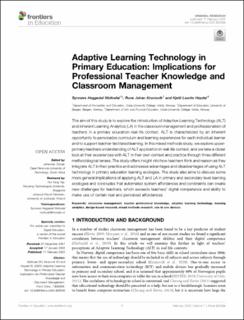Adaptive Learning Technology in Primary Education: Implications for Professional Teacher Knowledge and Classroom Management
Peer reviewed, Journal article
Published version
Permanent lenke
https://hdl.handle.net/11250/3050741Utgivelsesdato
2022Metadata
Vis full innførselSamlinger
Originalversjon
10.3389/feduc.2022.830536Sammendrag
The aim of this study is to explore the introduction of Adaptive Learning Technology (ALT) and inherent Learning Analytics (LA) in the classroom management and professionalism of teachers in a primary education real-life context. ALT is characterized by an inherent opportunity to personalize curriculum and learning experiences for each individual learner and to support teacher-facilitated learning. In this mixed methods study, we explore upper-primary teachers understanding of ALT application in real-life context, and we take a closer look at their experiences with ALT in their own context and practice through three different methodological lenses. The study offers insight into how teachers think and reason as they integrate ALT in their practice and addresses advantages and disadvantages of using ALT technology in primary education learning ecologies. The study also aims to discuss some more general implications of applying ALT and LA in primary and secondary level learning ecologies and concludes that automated system affordances and constraints can create new challenges for teachers, which exceeds teachers’ digital competence and ability to make use of certain real and perceived affordances.
